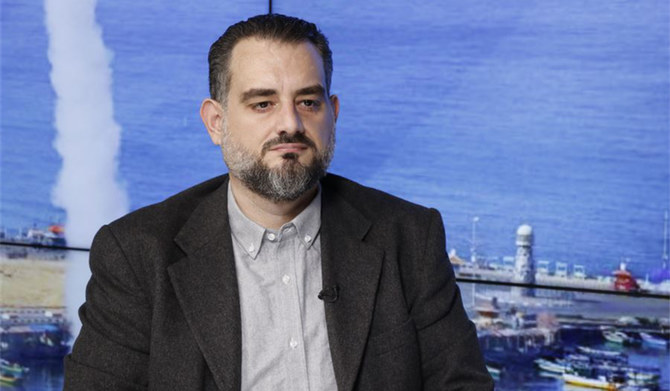BEIRUT: The Lebanese General Security detained Lebanese academic and political analyst Makram Rabah for five hours on Monday following his criticism of Hezbollah’s military presence in the Baalbek region.
Rabah’s views were taken from a television interview he had conducted late last week.
The analyst, who is also an assistant professor of history at the American University of Beirut, posted on social media that he was "informed of the need to appear before the General Security Security Investigation Department because they may want to question me about the meeting of the axis of ‘distraction and resistance’ held in Beirut last week.”
He mocked information leaked to media agencies about meetings held in the Lebanese capital secretly and without the knowledge of the Lebanese state about representatives of Hamas and the Yemeni Houthis, as well as other meetings between Iranian Revolutionary Guards Corps chief commander Esmail Qaani and Hezbollah Secretary General Hassan Nasrallah.
Rabah’s vocal opposition to Hezbollah and its allies is no secret. In recent days, he had been criticized by pro-Hezbollah activists, which included calls for the security services to summon him.
In the televised interview which lead to his summoning, Rabah stated that Israel does not view the city of Baalbek as “a Lebanese city; it is part of Hezbollah's supply lines that may affect it in its next war, and we, as Lebanese, will not be spared from a major Israeli strike because Hezbollah is the one that provoked Israel."
Rabah considered that "all Hezbollah’s smuggling routes, supply lines and factories are located in the Bekaa. The Israelis are in a constant state of monitoring targets, attacking military targets whenever they want, and Hezbollah can only use its drones to film weddings."
"Our country is not capable of fighting a war, which needs a good economic situation, banks, shelters and a food sector, while Hezbollah's actions resemble Aantara ibn Shaddad’s poems."
His interrogation was focused on the fact that he provided "information in the interview regarding Hezbollah’s locations, which was considered as coordinates for the enemy." However, Rabah replied that the information he had "had already been published in local and foreign media."
Military Court Investigative Judge Fadi Akiki decided to detain Rabah "after he refused to hand over his cellphone,” knowing that it was not in his possession. His lawyer Louay Ghandour explained that "the phone is irrelevant in a purely political investigation about a TV interview that has nothing to do with telecommunications."
Activists supporting Rabah took to social media opposing the detention and calling on all to “reject the ongoing oppression and declare solidarity with Rabah," with the aim of putting pressure to release him.
Sami Gemayel, head of the Lebanese Kataeb Party, called for Rabah's release, saying: "Just as we confronted and brought down the judicial security system in the recent past, we will not allow a return to fabricating files and restricting freedom of expression under any pretext."
Hours later, Judge Akiki decided to leave Rabah under investigation.
A judicial source told Arab News: “Judicial interventions led Judge Akiki to amend his decision and that he told those who asked him about it that ‘he was trying to put pressure on him and did not charge him with collaborating with Israel.’"
Following his release while he remained under investigation, Rabah considered that “what happened today proves that the military court is a tool to put pressure on activists who oppose Hezbollah.”
Rabah said: "If I were a Captagon dealer like Hezbollah, Investigative Judge Fadi Akiki would not have dared to detain me." "The Lebanese constitution preserves my right to express my opinion," Rabah said. "A collaborator is the one who lets the murderer of Luqman Slim in South Lebanon go free," he added.
This development against freedom of expression coincided with the continuation of hostilities on the southern Lebanese front between Hezbollah and the Israeli army.
















